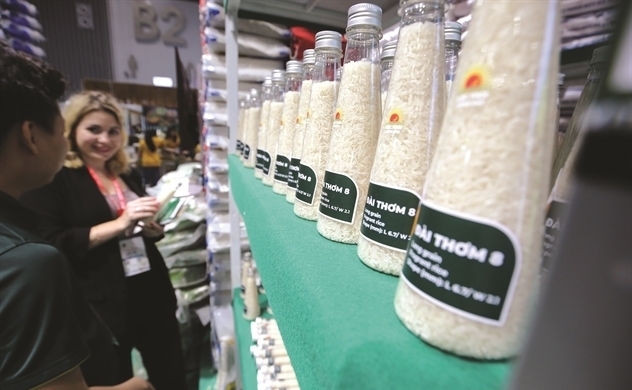Government makes strong efforts to achieve growth goal

Despite massive woes, the government will make great efforts to accomplish goals. Photo by NDO.
On August 8, at the 2023 Vietnam Wealth Advisor Summit organised in Hanoi, Deputy Minister of Planning and Investment Tran Quoc Phuong said, that despite great efforts with gradual recovery since early this year, Vietnam’s economic growth in the first six months of the year is estimated at 3.72%, lower than the target of 6.5% set earlier.
“This puts heavy pressure on meeting the GDP growth target of 6.5% this year,” Phuong said.
According to him, it is worrisome that currently, production and business activities in many fields are facing difficulties. Enterprises’ resilience was eroded after the COVID-19 pandemic, with many businesses forced to downsize production and business.
“The major challenges facing enterprises today are the market, cash flows, and cumbersome administrative procedures,” Phuong said. “Capital costs remain high, while businesses’ access to bank loans, corporate bond issuance, and securities offering are still very difficult.”
The economy’s credit growth by late June only increased by 4.28%, lower than the rate of 9.44%, recorded in the same period of 2022.
According to the Ministry of Planning and Investment (MPI), many investors and businesses have had to sell their stake and assets, as well as investment projects in the context of unfavourable merger and acquisition (M&A) market and while their performance comes to a standstill with no profits.
The General Statistics Office (GSO) reported that the first seven months of this year witnessed a year-on-year 0.7% drop in the index of industrial production (IIP). In the corresponding periods from 2019 and 2022, the year-on-year rate climbed 9.4, 2.6, 7.6, and 8.6%, respectively.
“Such a grey situation has been ascribed to the world economy facing tremendous difficulties in the first months of this year, which have had negative impacts on the domestic production activities,” the GSO said.
The IIP for processing and manufacturing went down by 1%, as compared to the corresponding period last year when such an IIP ascended by 9.5% year-on-year. The IIP of electricity production and distribution increased only 1.4% year-on-year, while the IIP of the industry of water supply and waste management and treatment upped 6.3%, and the mining industry dropped 1.2% year-on-year.
“It can be said that businesses in particular, and the whole economy in general, are having to ‘swim in a difficult vortex’. The same is also true for Vietnam’s financial market. Not only the corporate bond market but the stock market and the real estate market are also being hit by unprecedented difficulties and challenges,” Phuong stressed.
Light at the end of the tunnel
However, the economic trend is gradually getting better. The GSO’s statistics on industrial production, import and export, foreign direct investment (FDI) attraction, and public investment disbursement, have all proved that.
The IIP in July increased 3.9% on-month and 3.7% year-on-year. Cumulatively in the first seven months, FDI attraction has for the first time in the year increased by 4.5% over the same period last year, reaching nearly 16.24 billion USD. Total commodity export turnover stood at 195.4 billion USD, still down 10.6% year-on-year.
However, the MoIT said that this reduction is being narrowed down, as it remains lower than the year-on-year reduction of 12.1%, in the first six months of 2023. There has also been a trade surplus of 16.53 billion USD during the seven months.
Under the GSO’s Q2 survey on enterprises’ performance, regarding orders, 73.7% of businesses said that they expect a rise and stability in orders in Q3 as compared to Q2. Only 26.3% of respondents said they project a decrease in orders.
As for export orders, 72.9% of enterprises said they expect a rise and stability in orders in Q3 as compared to Q2. Only 27.1% of respondents said they predict a reduction in export orders.
According to the MPI, all these results are “thanks to the efforts of the entire political system, especially in the direction and administration of the government and the prime minister. Since the beginning of this year, they have promulgated many solutions, policies, directions and administration, in a drastic, timely, effective, and comprehensive manner, in all sectors.”
The government has also continued to focus on solving outstanding problems and obstacles, particularly in the real estate market, corporate bonds, and investment projects. This has helped create positive changes, unclog difficulties in cash flow and resources of the economy, and reinforce the confidence of businesses and investors.
For example, the government has enacted Decree No.08/2023/ND-CP, on amending, supplementing and suspending the effect of several articles in the Decrees, prescribing private placement and trading of privately placed corporate bonds in the domestic market and offering of corporate bonds in the international market.
“Decree 08 has removed some legal obstructions, making an important contribution to stabilising the confidence of the corporate bond market, helping many businesses issue new bonds, negotiate with investors to extend the term, and convert their debts to other forms of assets,” said MPI Deputy Minister Phuong. “Several problems vexing real estate enterprises and projects for many years in terms of certification, payment of land use fees, and land allocation have also been removed.”
Efforts for achieving growth goals
To promote growth, measures to accelerate the disbursement of public investment, increase exports, and stimulate consumption demand, have also been implemented drastically, synchronously, and effectively.
According to the MPI, this is a very heavy task, because if growth does not meet the target this year, it will affect the implementation of the Socio-economic Economic Development Plan for the 2021-2025 period, the Socio-economic Economic Development Strategy for 2021-2030, and even further targets for the 2030 - 2045 period, as proposed by the Resolution of the 13th National Party Congress.
Under the MPI’s calculations, even if this year achieves the growth target of 6.5%, the average GDP growth in 2024-2025 will have to be 7.76% a year to hit an average growth rate of 6.5% for the 2021-2025 period as expected. And if the growth rate in 2023 is only 6%, then the average growth rate for the two years of 2024-2025 must be 8%/year.
“These are very high growth rates, especially in the context that the global economy still has too many uncertain factors, while the domestic economy still has many potential risks,” Phuong stressed. “It is very difficult to achieve these rates without more breakthrough mechanisms and policies.”
Last week, Prime Minister Pham Minh Chinh required the State Bank of Vietnam (SBV) to continue carrying out the proactive and flexible monetary policy.
“The SBV must continue to reduce lending rates and increase credits, in line with the real developments of the market while boosting money supply into the economy, when necessary. The credits must be focused on growth momentum including investment, consumption, and export,” PM Chinh stated.
In mid-July, PM Chinh also enacted Resolution No.105/NQ-CP, on tasks and solutions to help remove difficulties for enterprises, including big stress laid on boosting administrative reform. Resolution 105 stated that the SBV must specify a credit growth rate of 13-15%, for the whole of 2023 and even higher.
“How to increase credits must be announced immediately via proper measures, with a specific quota for credit growth for commercial banks, until late 2023,” the resolution stated. “Sufficient capital must be provided for the economy, with due attention paid to credits for property and for production and business activities to support the market and unleash investment capital flows for the economy.”
In August, the SBV will propose a credit package worth 10 trillion VND (over 416.6 million USD) for businesses specialised in fishery processing and aquatic products, and other types of credit packages. Also this month, the government will enact a decision on reducing 30% of the land rental for 2023.
“We will also revise and remove business conditions currently stipulated in specialised laws if such conditions are found illegal, unnecessary, infeasible, and unclear. Moreover, the government will also review and revise all kinds of practising certificates, to reduce their number and save costs for society,” PM Chinh stated at last week’s government meeting, on the national socioeconomic situation.
The government and the prime minister have also directed the SBV to reduce the deposit interest rate, in line with inflation developments, decrease the lending rate, manage the exchange rate flexibly, and securely stabilise the foreign exchange market and balance the supply and demand of foreign currencies.
Source: Nhân Dân

 TIẾNG VIỆT
TIẾNG VIỆT 










_131447820.png)







